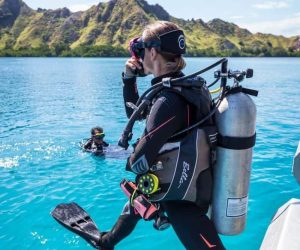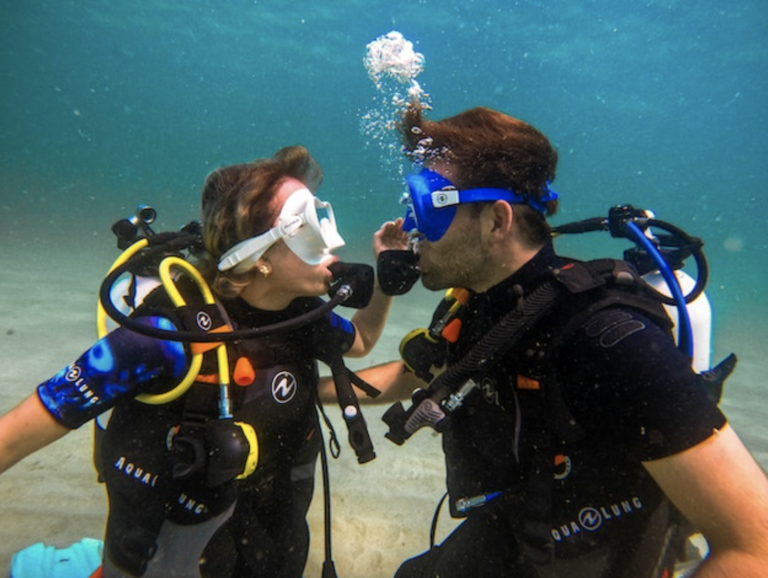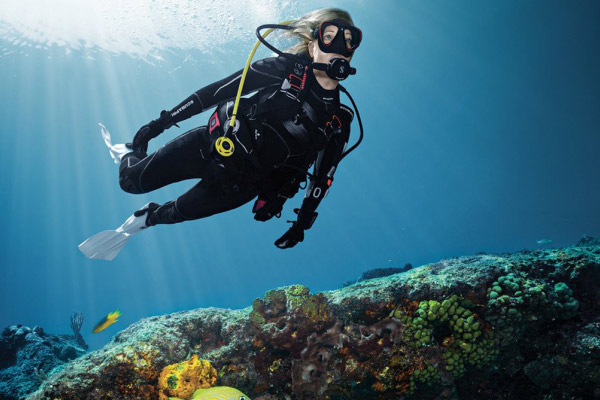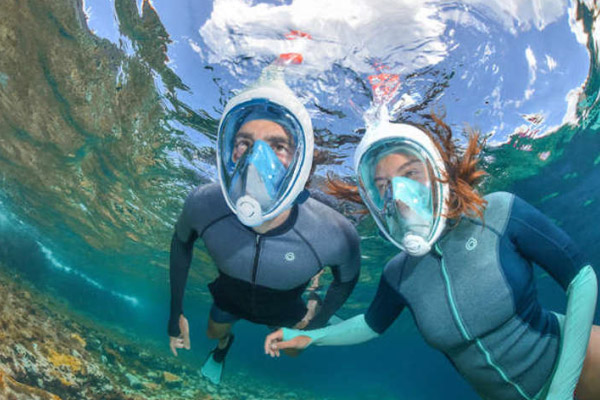To be able to dive anywhere in the world, it is necessary to present your diving certification. This is to demonstrate that the diver knows how to use the equipment correctly and how to handle any eventuality.
A basic certification is enough and you can get it here in Brazil easily. On the other hand, many destinations allow you to complete the course during your trip, which is wonderful.
From how old? At least 10 years old, in good physical condition and able to swim perfectly. Therefore, anyone with a health problem must obtain authorization to practice the activity and provide the school with a medical certificate.
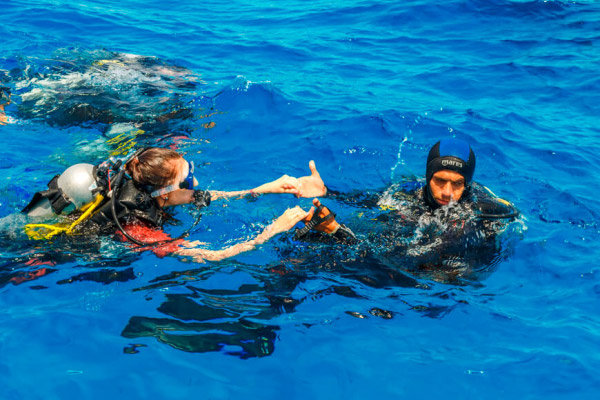
Contents
What is scuba certification?
The diving certifier is the body responsible for regulating the practice of the activity and for recognizing and guaranteeing the effectiveness of the courses offered. They allow us to demonstrate quality before, during and after creation.
A relatively new certification body in the Brazil started connecting with local schools and speaking out about 30 years ago. With all their experience and international recognition, we can say that they have changed the diving market in the country.
The association is responsible for providing the theoretical and practical learning methods for its partner schools. In addition, they also provide all the support needed to get the job done. After completing the diving course, the student receives a diving license.
There are currently hundreds of certification bodies operating on the market, including SSI, PDIC, ADS, CMAS, PADI and NAUI, the last two being the most recognized and accepted in this area.
Diving Certification: Which one to choose?
A good option for most visitors is the Open Water Diver, issued by the Professional Association of Diving Instructors (PADI). Levels are easy, but you can already dive up to 18 meters in over 186 countries.
Also, it doesn't necessarily need to be supervised, just with another certified diver, not necessarily an instructor.
out of this diving certification, there are more than 30 other specialties such as night diving and cave diving.
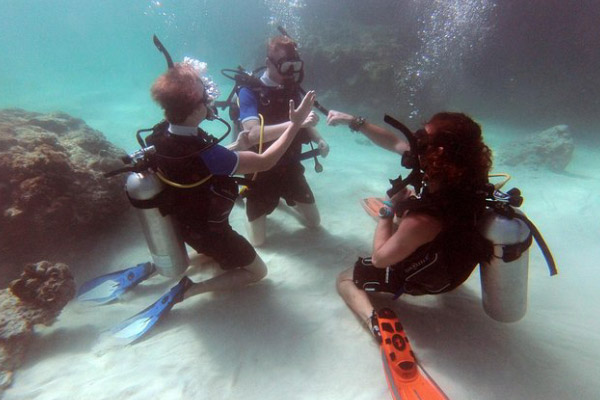
It is worth remembering that the diving license is for life. That is, no update is required. Sensational, right? No queues or benches to face.
Why take the Basic Course (Open Water)?
The PADI Open Water Diver certification, the most recognized and respected category on the globe, gives the newest diver the freedom to explore anywhere in the world with their buddy without the need for professional instructor supervision.
What do I need to get started?
Almost anyone who is in good physical condition, reasonably fit and comfortable in the water can become an Open Water Diver.
For children ages 10 to 14, or if you have children that age, PADI offers a program called the PADI Junior Open Water Diver.
What will I learn during the Open Water Diver course?
Have you ever felt that something was missing during your summer vacation while spending long hours at beach? While walking along the coast, wondering what kinds of creatures do these waters call home?
Now it's time to open up to exciting adventures and find out why the diving it's such an addictive sport. Of course, reading about something is never as good as seeing it with our own eyes. So why not take your diving certification?
What is the Open Water Diver step by step?
The course is divided into three parts of different durations, starting with theoretical classes to learn the basic rules.
Then the student will dive into the water. For 2-5 days, instructors will teach the concepts that the next certified diver needs to practice in the pool.
You will learn to use cylinders, adjust equipment, solve problems, draw water from masks and share oxygen when necessary.
Finally, you must complete 4-5 open water dives (the so-called checkout), i.e. at sea, with a certified diving instructor.
After Open Water Diver – What's Next?
Are you ready for your next certification? If you're like most people, avoid looking like a novice diver. The fastest way to improve your skills is to take more diving courses.
About one in four divers take the Advanced Open Water course, while others seek specialized courses to improve their buoyancy control, underwater navigation or underwater photography.
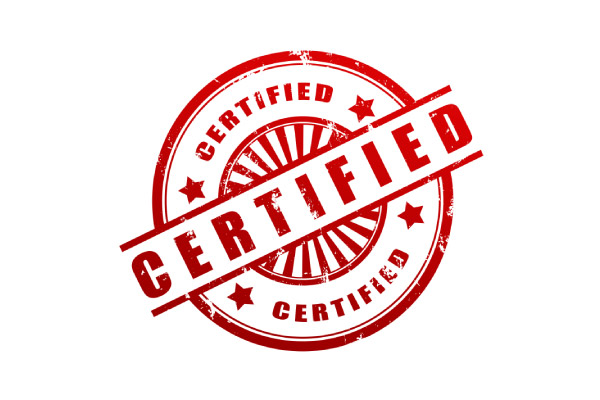
The following article will show you the various PADI specialty courses that are available. Please note that some specialty courses require an Advanced Open Water certification first.
Open Waters: Advanced course
If you're not sure which PADI course to take next, the Advanced Open Water course is a great option.
You'll take your first deep dive with an instructor by your side, work on your navigation skills and try out three different specialty courses.
Choose what interests you: photography and filming, wreck diving, fish identification, etc. There is no exam and compared to the open water course you will have to read very little to study.
Prerequisites for advanced diving:
- Minimum age 12 years;
- Be an Open Water Diver.
- Complete the Medical Declaration form (Consultation Template) provided by your instructor
- If applicable, provide a medical certificate proving fitness to dive.
Specialty: Deep Diving
The enchantment of the abyss. There's something exciting and mysterious about exploring deeper dive sites, so perfect yourself with a diving certification deep is an excellent decision.
Deep diving offers the most exhilarating and exhilarating experience. The Deep Diver Specialty Course is the perfect training course to prepare you for this. There is something fascinating about exploring the depths of the ocean around the world.
Often, wreckage is dragged below 60 feet or embankments are torn down. Anyway, to safely dive to 40 meters, you must do the Deep Diver.
Prerequisites for deep diving
- Adventure Diver or higher certificate
- Complete the Medical Declaration form (Consultation Template) provided by your instructor
- If necessary, present a medical certificate as proof of aptitude for diving
Master Diver: Highest level of recreational
You may have heard the term “Master Diver” or “Master Scuba Diver” and wondered what it means. Master Scuba Diver is the highest level that can be achieved in recreational diving.
To become a Master Scuba Diver you must:
- Hold an Open Water Diver, Advanced Open Water Diver and Rescue Diver certification
- Have completed five Specialty Diver courses
- Have at least 50 dives in your logbook
- Be at least 18 years old
Less than two percent of all divers become Master Scuba Divers. Therefore, it is very rare to find someone with this level of experience and dedication. For this reason, the Master Scuba Diver is sometimes referred to as the “black belt of diving”.
What equipment for scuba diving? – diving certification
Diving equipment is and always will be an investment. A tip right at the beginning, the diver doesn't need everything right away!
Especially in the beginning, after securing your diving certification, you can get bogged down, because there are many brands on the market, as well as beers, that still don't say anything.
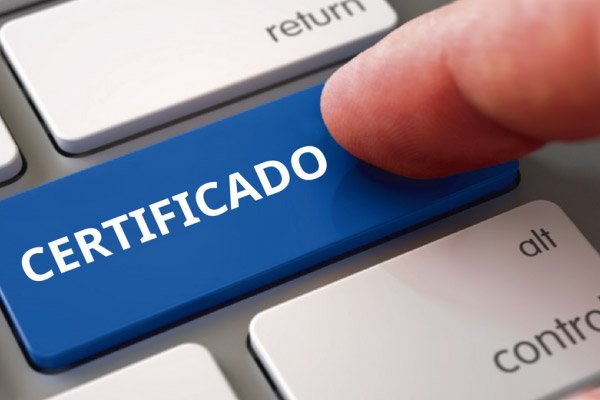
Either way, it's a world unto itself. At the same time, there are many opinions that could not be more different. Apart from the fact that you don't know what you really need for your first dives. Then there are the numerous variants and systems.
Regulator
One of the most important equipment for divers is the regulator. A pressure regulator is used in diving to adjust the pressure of the breathing mixture to the environment.
buoyancy vest
The vest that divers wear to adjust buoyancy. THE jacket works by pumping air in or out of the vest, so you can always adjust the buoyancy individually and, depending on whether you want to sink or rise to the surface, inflate or deflate the vest.
Diving mask
Diving masks are available in many different styles, but they all serve the same function: to give the diver a clear view and protect the eyes from the dangers of the ocean.
The three main types of diving goggles are split lenses, that is, with two lenses built into the frame, single lens and multiple lens. Divers are also able to choose between different frameless and framed materials.
Always make sure your goggles fit snugly before using them in water for the first time. When you put the mask on your face, you should not be able to breathe through your nose. If you do, you will need to wear a different size/pair of glasses.
For freedivers, the volume of the goggles is important. Volume is primarily created by the distance between the lens and the face. Many divers find goggles with less volume more comfortable.
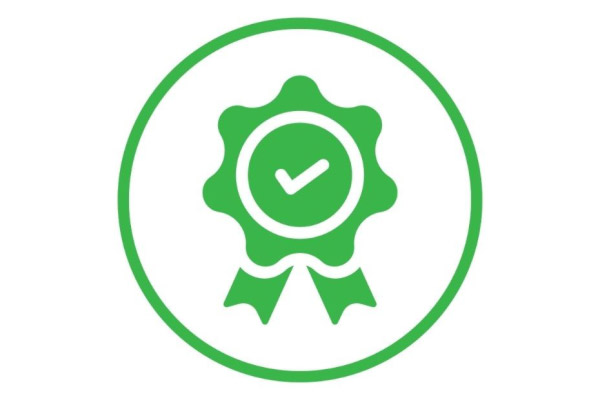
What is the diving experience with the Ikigai team?
Regardless of having a diving certification or not, the Ikigai Experience is in the most different places in our country to provide you with an unforgettable recreational dive with everything you are entitled to.
So, let's get to know the seabed of Ubatuba or, who knows, Cabo Frio? We are in several cities! Don't waste any more time thinking about your next vacation destination.
The Ikigai team is made up of qualified instructors so that your stay at the bottom of the sea does not go unnoticed. Whether alone or accompanied, diving with our help will be an eternal memory in your thoughts.
Did you pack your bags?

